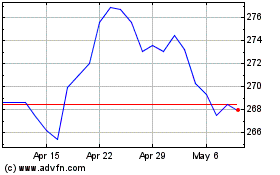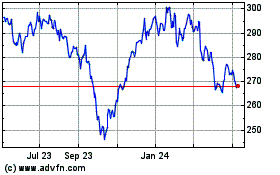Facebook Sinks After Growth Warning -- WSJ
26 July 2018 - 5:02PM
Dow Jones News
By Deepa Seetharaman
This article is being republished as part of our daily
reproduction of WSJ.com articles that also appeared in the U.S.
print edition of The Wall Street Journal (July 26, 2018).
Facebook Inc. warned that its growth is slowing, sending its
stock price plummeting as investors feared the social-media titan's
fortunes aren't immune to the multiple controversies it has faced
this year.
After touching record highs earlier on Wednesday, Facebook
shares dropped as much as 23% in after-hours trading, a plunge that
would wipe roughly $130 billion from the company's value if it
holds when the markets open on Thursday. That would be more than
the entire market value of McDonald's Corp., although after-hours
declines don't always correspond to market prices the next day.
Facebook has shown few business effects from the negative
headlines that have dogged it in recent months. But winding up a
quarter during which its privacy practices stirred fresh
controversy, the company late Wednesday reported
slower-than-expected revenue growth for the period -- albeit
logging in at more than 40% -- and said it expected quarterly
revenue growth to decline over the rest of the year.
The Menlo Park, Calif., firm also showed sluggish user trends in
some of its most lucrative markets, including the U.S. and Canada,
in the second quarter.
Daily active users in the U.S. and Canada measured at 185
million, flat with the first quarter and up slightly from a year
earlier. Facebook's daily user base in Europe edged down to 279
million accounts, from 282 million in the prior quarter. Facebook
executives said that decline stemmed from a tough new European
privacy law that went into effect in the second quarter.
Some worried that the results suggest growth could be threatened
not just for Facebook but also for other tech companies that depend
on consumers spending ever-more time on their digital devices. "I
can't help but wonder if this is an early warning sign that the
market's assumptions about tech companies' growth failed to account
for the fact that each of us only has 24 hours in a day," said Jim
Anderson, CEO of SocialFlow, a platform for publishers to post
stories on Facebook and other social-media sites.
Prior to Wednesday's report, most analysts expected Facebook to
continue its streak of impressive growth that seemed impervious to
controversies about the platform's operations.
For the second quarter, Facebook reported earnings per share of
$1.74, up from $1.32 a year earlier. Revenue increased 42% to
$13.23 billion. Analysts, on average, expected earnings of $1.72 a
share on revenue of $13.36 billion, according to Thomson
Reuters.
The last time Facebook missed analyst estimates for revenue was
in the first quarter of 2015.
In a call with analysts, Facebook Chief Executive Officer Mark
Zuckerberg called the results "another solid quarter" -- but those
comments were quickly overshadowed when other executives warned
that tougher privacy laws, a shift toward less lucrative
advertising products and currency headwinds would clip revenue
growth.
They noted that the revenue growth rate fell seven percentage
points in the second quarter compared with the first three months
of the year and said the company expected quarter-to-quarter
revenue growth rates to decrease by "high single-digit percentages"
in the second half of 2018.
The company also said its expenses would rise faster than
revenue in 2019 and projected that its operating-margin percentages
would be in the mid-30s over the next several years, due to higher
spending on product and infrastructure. The second-quarter margin
was 44%.
The results "showed growth but geographically have pockets of
softness," said Daniel Ives, head of technology research at GBH
Insights.
Facebook's global reach and impact on the world have been under
scrutiny since the 2016 U.S. presidential election, when the social
network attracted criticism for allowing fabricated news articles
to flourish on the site.
Those issues intensified in March, when it suspended political
analytics firm Cambridge Analytica for improperly accessing data
from as many as 87 million Facebook users. That disclosure forced
Mr. Zuckerberg to testify in front of lawmakers on both sides of
the Atlantic in early April.
On the call Wednesday, Mr. Zuckerberg acknowledged that Facebook
needed to invest more in security measures to prevent the platform
from being manipulated. He also pledged that the company wouldn't
stop building new products "because that wouldn't be the right way
to serve our community and because we run this company for the long
term, not for the next quarter."
Despite those controversies, advertisers broadly speaking have
remained on the site, largely because there are few other outlets
that can match its reach and ability to target narrow slices of
consumers.
"It's going to take a lot more than the scandals they have had
to change to the way that advertisers are using their dollars,"
said Aaron Goldman, chief marketing officer of marketing technology
firm 4C Insights.
The support of advertisers was a key reason for continued
investor enthusiasm for the stock. Before the after-hours plunge,
Facebook's share price was up 26% since the Cambridge Analytica
revelations in March.
Write to Deepa Seetharaman at Deepa.Seetharaman@wsj.com
(END) Dow Jones Newswires
July 26, 2018 02:47 ET (06:47 GMT)
Copyright (c) 2018 Dow Jones & Company, Inc.
McDonalds (NYSE:MCD)
Historical Stock Chart
From Mar 2024 to Apr 2024

McDonalds (NYSE:MCD)
Historical Stock Chart
From Apr 2023 to Apr 2024
